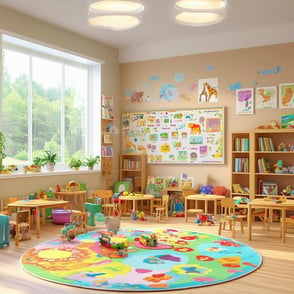Discover the wonders of outdoor learning for preschoolers and explore nature's classroom through fun and educational forest school Early Years Education activities. From London's parks to green spaces, find out how to teach preschoolers about the natural world while having a great time!
The Benefits of Outdoor Learning for Preschoolers
Outdoor learning provides numerous benefits for preschoolers. It allows them to engage with the natural world, fostering a sense of wonder and curiosity. By spending time outdoors, children can develop a deeper appreciation for nature and its beauty. They can observe plants, animals, and insects in their natural habitats, learning about biodiversity and the interconnections of ecosystems.
Moreover, outdoor learning promotes physical activity and gross motor skills development. Preschoolers can run, jump, climb, and explore their surroundings, enhancing their coordination and balance. Being in nature also encourages imaginative play and creativity, as children can create their own games and stories inspired by the natural elements around them.
Outdoor learning also has cognitive benefits. It stimulates critical thinking and problem-solving skills, as children encounter new challenges and obstacles in the natural environment. They learn to adapt, make decisions, and find solutions independently. Additionally, being outdoors can improve attention and focus, as the ever-changing sights, sounds, and textures capture children's interest and stimulate their senses.
In terms of social-emotional development, outdoor learning promotes teamwork, cooperation, and communication. Preschoolers can engage in collaborative activities, such as building forts or solving nature-themed puzzles, fostering social skills and empathy. Spending time in nature also reduces stress and anxiety, providing a calming and peaceful environment for children to relax and recharge.
Overall, outdoor learning offers a holistic approach to preschool education, nurturing physical, cognitive, and socio-emotional development. By integrating nature into the curriculum, educators can create a rich and meaningful learning experience for their preschoolers.
Exploring London's Parks and Green Spaces
London is home to a plethora of parks and green spaces that serve as excellent outdoor classrooms for preschoolers. These natural environments provide endless opportunities for exploration, discovery, and learning. Here are some of the top parks and green spaces in London that are perfect for teaching preschoolers:
- Hyde Park: This iconic park offers a wide range of activities for preschoolers, including nature walks, pond dipping, and bird watching. The Diana, Princess of Wales Memorial Playground is also a must-visit, with its pirate ship, sensory trail, and sandpit.
- Richmond Park: With its expansive meadows, woodlands, and deer herds, Richmond Park provides a unique opportunity for preschoolers to connect with nature. They can spot various wildlife, learn about different tree species, and engage in nature-themed scavenger hunts.
- Kew Gardens: Known for its stunning botanical collections, Kew Gardens is a treasure trove of educational experiences for preschoolers. They can explore the Children's Garden, attend workshops on plant life cycles, and participate in interactive storytelling sessions.
- Hampstead Heath: This vast green space offers diverse habitats, from grasslands to woodlands, making it an ideal destination for preschoolers to learn about biodiversity. They can go on nature trails, observe insects, and engage in nature-based art activities.
These are just a few examples, but London has many more parks and green spaces waiting to be discovered. Whether it's a local park or a larger nature reserve, preschoolers can embark on exciting adventures and learn about the natural world right in their own city.
Engaging Activities for Preschoolers in Nature
When teaching preschoolers in nature, it's important to provide engaging activities that capture their interest and curiosity. Here are some ideas for fun and educational outdoor activities:
- Nature scavenger hunt: Create a list of items for preschoolers to find in nature, such as leaves, flowers, rocks, or animal tracks. Encourage them to explore their surroundings and check off the items as they find them.
- Sensory nature walk: Guide preschoolers on a sensory journey through nature. Encourage them to use their senses to observe and interact with the natural elements around them. Ask questions like, 'What does the grass feel like?' or 'What sounds do you hear?' to stimulate their sensory awareness.
- Nature art: Provide materials like leaves, twigs, and flowers for preschoolers to create nature-inspired artwork. They can make leaf rubbings, create nature collages, or paint with natural pigments like crushed berries or mud.
- Planting and gardening: Teach preschoolers about plant life cycles by involving them in planting and gardening activities. They can sow seeds, water plants, and watch them grow over time. This hands-on experience fosters a deeper understanding of the natural world.
- Outdoor storytelling: Find a quiet spot in nature and engage preschoolers in storytelling sessions. Use books or create your own stories inspired by the surroundings. Encourage children to imagine and share their own nature-themed stories.
These activities not only provide opportunities for learning but also foster a sense of connection and appreciation for the natural world. Preschoolers can develop their observation skills, creativity, and scientific thinking while having fun outdoors.
Safety Considerations for Outdoor Learning
When conducting outdoor learning activities with preschoolers, safety should always be a top priority. Here are some key considerations to ensure a safe learning environment:
- Supervision: Always have a sufficient number of adults present to supervise the children. Maintain a close watch on their activities and ensure they stay within designated areas.
- Risk assessment: Conduct a thorough risk assessment of the outdoor learning environment. Identify potential hazards, such as uneven terrain, bodies of water, or poisonous plants, and take necessary precautions to minimize the risks.
- Weather conditions: Keep an eye on weather forecasts and plan activities accordingly. Avoid outdoor learning during extreme weather conditions, such as heavy rain, strong winds, or extreme heat. Dress preschoolers appropriately for the weather and provide sun protection when needed.
- First aid and emergency procedures: Have a first aid kit readily available and ensure that adults are trained in basic first aid. Establish clear emergency procedures and communicate them to all adults involved in the outdoor learning activities.
- Allergies and medical conditions: Obtain information about any allergies or medical conditions that preschoolers may have. Take necessary precautions and ensure that appropriate medications are readily available in case of emergencies.
By prioritizing safety, educators can create a secure and enjoyable outdoor learning experience for preschoolers, allowing them to explore and learn in a risk-aware environment.
Creating Lasting Memories and Skills
Outdoor learning in London's parks and green spaces not only provides educational benefits but also creates lasting memories and skills for preschoolers. Here are some ways to enhance their learning experience and make it memorable:
- Encourage reflection: After outdoor activities, provide time for preschoolers to reflect on their experiences. Ask open-ended questions like, 'What did you learn today?' or 'What was your favorite part?' This reflection helps consolidate their learning and encourages them to express their thoughts and feelings.
- Nature journals: Introduce preschoolers to the concept of nature journals, where they can record their observations, drawings, and thoughts about their outdoor adventures. Encourage them to use descriptive language and express their creativity in their journals.
- Nature photography: Provide preschoolers with simple cameras or smartphones (under supervision) to capture the beauty of nature. Teach them basic photography techniques and encourage them to take photos of interesting plants, animals, or landscapes. This activity helps develop their observation skills and allows them to document their outdoor experiences.
- Celebrate achievements: Acknowledge and celebrate preschoolers' achievements in outdoor learning. Whether it's completing a nature-themed project or identifying different bird species, praise their efforts and highlight their accomplishments. This recognition boosts their confidence and motivates them to continue exploring and learning in nature.
- Involve families: Engage families in the outdoor learning journey by sharing photos, stories, and updates about the preschoolers' experiences. Encourage parents to continue exploring nature with their children outside of school hours, fostering a strong connection between home and school.
By implementing these strategies, educators can ensure that preschoolers not only gain knowledge and skills but also develop a lifelong love for nature and a sense of stewardship towards the environment.

26-Jan-2024 11:34:37
Related Articles





Write a Comment